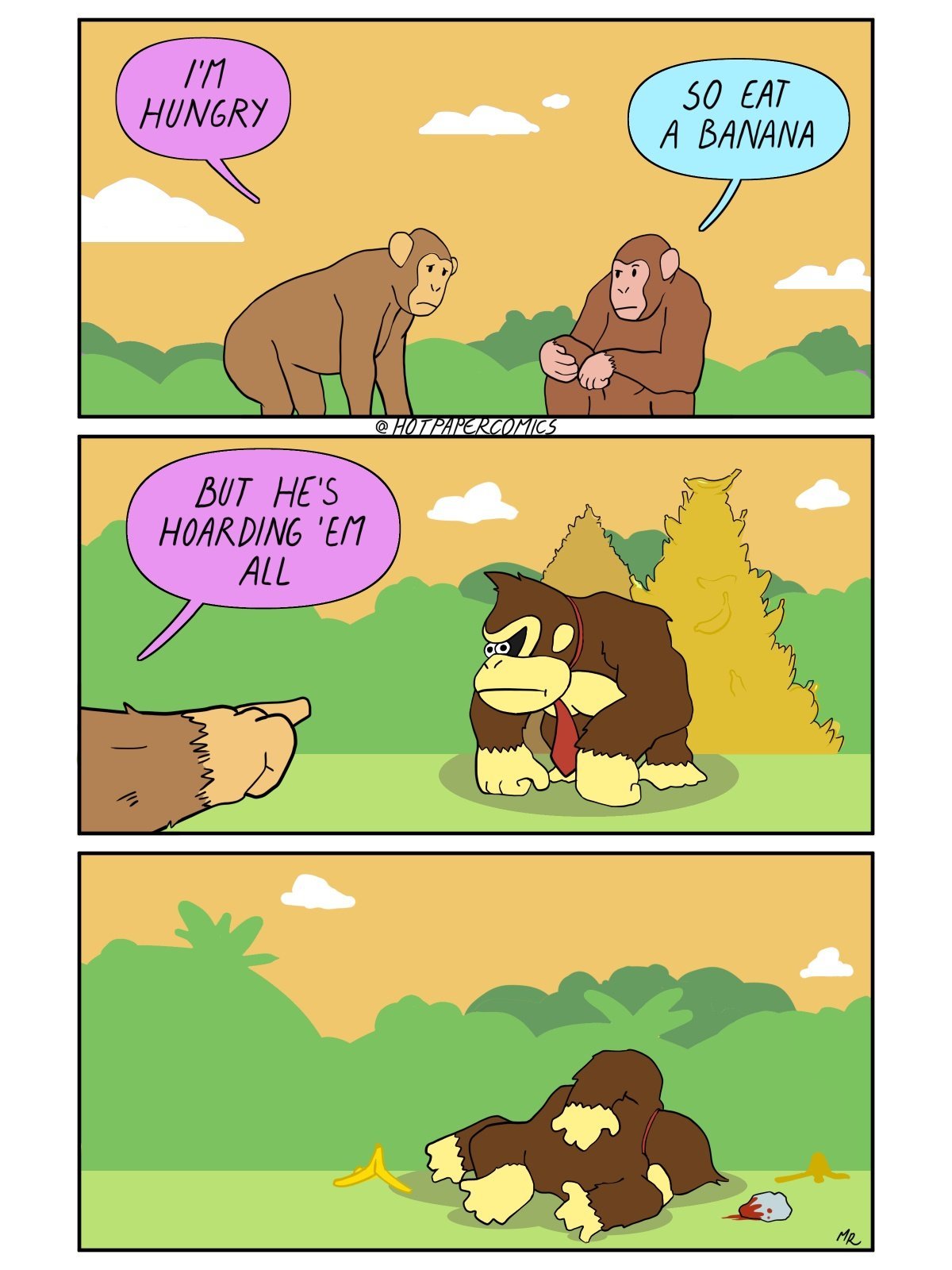The One Percent
-
[email protected]replied to [email protected] last edited by
I thought canonically it was the whole island’s vault of bananas in Donkey Kong country.
-
Perhaps. I mean yeah the history of humanity over the past 2000 years has been brutal. But we go back much farther than that.
I have a real problem with you saying that in the last 20-30 years humanity has chilled out. We've got multiple genocides going on, constant religious conflict, land war in Europe. The United States is so fucked I can't even begin to list the reasons why, and it's on the brink of some really bad things.
How many people can you kill with a club?
How many people can you kill with a sword?
How many people can you kill with a gun?
How many people can you kill with a cluster bomb? -
[email protected]replied to [email protected] last edited by
You got some countries that it has worked long term?
-
Dude, I’m just trying to sit here and eat some Oreos.
-
Our typos
-
And if somebody does somehow build a rival force to take the bananas, nothing truly changed it's just the same system with different apes in the same amount, or actually even worse than the first system which was built upon individual representation which could easily be lost.
-
[email protected]replied to [email protected] last edited by
Presence of genocide isn't really an argument against it having chilled out. Empires were born and died all the time in the past, genocides were standard practice by legions, nations consuming each other through war was a constant.
France has been involved in over 200 wars in its history.
Things are different now. Borders being unstable make national headlines. Aggressors in conflicts fact opposition from the entire world even if the defender is a minor state like Ukraine.
Before industrialized agriculture, the Human Population never breached a billion. In the past there was not equity, there was mass starvation for many ruled over by an aristocracy whose only major contribution was organizing militaries to either take food from others or prevent their own food from being taken. All over the world it was common to sell your children because you could not feed them.

-
[email protected]replied to [email protected] last edited by
I found "The Better Angels of Our Nature" interesting and well-researched, it changed my opinion on this.
-
[email protected]replied to [email protected] last edited by
Ostrom helped disprove the idea held by economists that natural resources would be over-used and destroyed in the long run. Elinor Ostrom disproved this idea by conducting field studies on how people in small, local communities manage shared natural resources, such as pastures, fishing waters in Maine and Indonesia, and forests in Nepal. She showed that when natural resources are jointly managed by their users, in time, rules are established for how these are to be cared for and used in a way that is both economically and ecologically sustainable.
For a deeper dive watch this video or the afore mentioned podcast episode.
-
People downvoting you do not know much history, and believe only what they want to.
-
[email protected]replied to [email protected] last edited by
She showed that when natural resources are jointly managed by their users, in time, rules are established for how these are to be cared for and used in a way that is both economically and ecologically sustainable.
Until one tech bro or finance guy comes along. So no countries then. Don't you think in the last hundreds of years of recorded history that you could have come up with one?
-
[email protected]replied to [email protected] last edited by
Well, she was born in 1933 so her fieldwork took place less than 100 years ago...
Also great moving the goal post on your side. You said pure socialism doesn't work and asked for long term, I gave you that. Now you say this isn't within the last hundreds of years which is wrong. If by country you mean nation state, I can't give you an example and I'm pretty sure this is the only thing you take out of this comment. There are alternatives to nation states. If you ask for people fighting today for a stateless society, look up Rojava or the Zapatistas. If this is too far away from Europe for you, look up the anarchosyndicalists in Spain less than a century ago. If you have specific criteria, maybe give them beforehand. If you are a troll, go fuck yourself. Also big citation needed that one techbro destroyed the forest commons in Nepal.
-
[email protected]replied to [email protected] last edited by
Not moving goal posts. Last comment because you're obviously not wanting to answer. A successful socialist country or nation state is what I'm asking for and have been asking for all along.
Name one country or nation state that has made it work long term (let's say 10 years) in the last HUNDREDS of years. Pick a century, any century. You can choose from any time period you want.
I know this is breaking your brain, good luck.
-
[email protected]replied to [email protected] last edited by
To make it more obvious that already: I'm an anarchist. I am against nation states. I do not believe in socialist states because I am against all states. I gave you enough examples of non- and anti-state projects already. The liberation of Kobane is a little more than 10 years ago so Rojava. The Zapatistas declared independence in 1994. The commons discussed earlier went on for centuries in areas big enough to be several states. But they don't count because they didn't have a head of state, three levels of administration and a parliament?
-
[email protected]replied to [email protected] last edited by
You think this is a situation to be envious of?
https://en.m.wikipedia.org/wiki/Siege_of_Kobanî
I think we're not only on the same page, but at different libraries. Good luck to you.
-
[email protected]replied to [email protected] last edited by
YPG-led forces recapture the whole of Kobanî city in late January 2015
So counting the recapture, it's a little less than 10 years but [t]he region gained its de facto autonomy in 2012 which is 12 years and counting. I hope you didn't think I sided with the Islamic State for some reason which sieged the city for 6 months.
-
[email protected]replied to [email protected] last edited by
Aren't we going back to a Bernie Sanders thing? A socialist democracy.
The AANES has widespread support for its universal democratic, sustainable, autonomous, pluralist, equal, and feminist policies in dialogues with other parties and organizations.[
-
[email protected]replied to [email protected] last edited by
Both democracy and socialism have a wide range of meanings. AANES has a confederal council democracy, a much more direct democracy than the US or any other nation state. Their concept of socialism is much more radical than Sanders's.
-
(Copying my comment on a similar, older post, because I really want to share this info again since I think it’s fascinating:)
The notion that the early formation of societies was based on security rather than empathy is outdated. Compassion has many evolutionary advantages, especially in primate species where offspring are born vulnerable. It’s clearly evident in other primates who live in groups (or ‘societies’), as a driving force of cooperation and group cohesion.
Here’s a recent paper (2022) by Penny Spikins, PhD at the University of York, Department of Archaeology, that explores how compassion shaped early human evolution and the formation of societies: The Evolutionary Basis for Human Empathy, Compassion and Generosity.
And here’s another from 2011 by Goetz et al that explores in detail the evolutionary advantages of compassion: Compassion: An Evolutionary Analysis and Empirical Review.
Those papers are both fascinating reads, and I highly recommend them for a deeper understanding of why and how empathy is crucial to our success as a species.
(For a couple of centuries, the narrative has been humans are warlike and that’s what dominated our development, but that’s simply not true. We’ve been that way for the past couple thousand years, but largely not before that. I’ll leave up to the reader what significant ‘development’ coincided with that shift in our overall behaviour.)
-
Good points, and great articles. Thank you.

